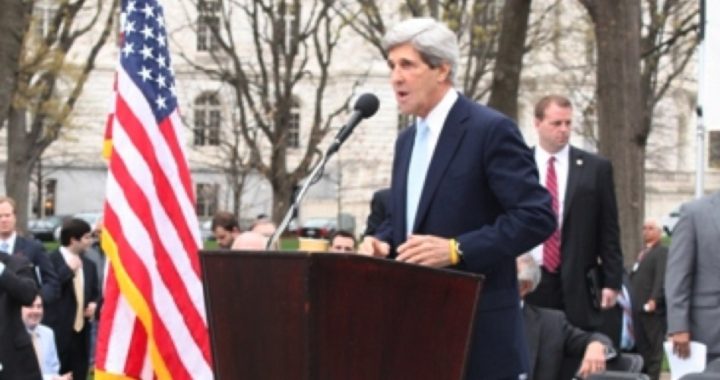
In a statement posted on the State Department website on March 15, Secretary of State John Kerry (shown) expressed U.S. support for the UN Arms Trade Treaty.
“The United States is steadfast in its commitment to achieve a strong and effective Arms Trade Treaty that helps address the adverse effects of the international arms trade on global peace and stability,” read the statement.
With obvious awareness of potential objections to any agreement entered into by the United States that would limit access to arms, Kerry’s statement carefully made a distinction between international and domestic arms exchanges:
The United States could only be party to an Arms Trade Treaty that addresses international transfers of conventional arms solely and does not impose any new requirements on the U.S. domestic trade in firearms or on U.S. exporters. We will not support any treaty that would be inconsistent with U.S. law and the rights of American citizens under our Constitution, including the Second Amendment.
Kerry’s statement was issued in advance of the UN Conference on the Arms Trade Treaty (ATT), which opened March 18 at UN headquarters in New York and will run through March 28. A statement posted on the conference website noted that this current event was called to conclude the work begun at the UN last July to establish an ATT. The website authors sought to reassure those who might have concerns about the ATT, saying that the treaty will not “interfere with the domestic arms trade and the way a country regulates civilian possession,” but will “aim to create a level playing field for international arms transfers by requiring all States to abide by a set of standards for transfer controls, which will ultimately benefit the safety and security of people everywhere in the world.” (Emphasis added.)
A March 15 report in The Hill quoted a statement from Sen. John Cornyn (R-Texas) in opposition to the ATT. “The United Nations’s Arms Trade Treaty contains unnecessarily harsh treatment of civilian-owned small arms, and I urge President Obama to reverse course and block any further negotiations,” Cornyn said on March 15. “Not only would it violate Texans’ Second Amendment rights, including the right to self-defense, it also raises U.S. sovereignty and national security concerns.”
Reports from Reuters and Fox News noted that the National Rifle Association has warned that the treaty would undermine the right to bear arms and that the NRA will fight hard to prevent ratification if the Obama administration supports the treaty.
The text of a speech delivered by the NRA Executive Vice President Wayne LaPierre at last July’s UN Conference on the Arms Trade Treaty is posted on the NRA-ILA website. During that address, LaPierre specifically addressed the threats posed by the ATT, raising several key points:
One year ago, I delivered to the Preparatory Committee our objections to including civilian arms in the ATT. I said then … and I will repeat now … that the only way to address NRA’s objections is to simply and completely remove civilian firearms from the scope of the treaty….
Without apology, the NRA wants no part of any treaty that infringes on the precious right of lawful Americans to keep and bear arms.
Let there be no confusion. Any treaty that includes civilian firearms ownership in its scope will be met with the NRA’s greatest force of opposition….
Any Arms Trade Treaty must be adopted by two-thirds of the U.S. Senate, which has 100 members. Already, 58 Senators have objected to any treaty that includes civilian arms, and a majority of the U.S. House of Representatives also opposes such a treaty.
During that speech, LaPierre did not state opposition to the U.S. ratification of any UN arms treaty that does not address civilian firearms ownership. Yet, information posted on the NRA-ILA website demonstrates the danger of U.S. recognition of “international law.” For example:
Can the President bypass the ratification process?
Strictly speaking, no. But an anti-gun administration could still try to use the treaty to impose gun control in the U.S.
Even if the Senate defeats any effort to ratify the treaty, anti-gun activists in the administration could argue that, under customary international law, the U.S. must implement the treaty’s restrictions lest we violate its “object and purpose.”
This tactic has been used before. For example, the United States has never ratified the U.N. Law of the Sea treaty, but treats parts of that treaty as binding on the U.S.
The Obama administration could easily take the same approach with respect to an Arms Trade Treaty — for instance, by arguing in court that a narrow interpretation of the Second Amendment is necessary to comply with our obligations under “customary international law.”
It is international law that gives perceived authority to the UN to invade the rights of sovereign nations by intervening in their domestic governance. (Consider the “no fly zones” imposed on Iraq’s Saddam Hussein during the period between the two Gulf wars.)
A sculpture of a “knotted gun” entitled Non-Violence, gracing the grounds at UN Headquarters, has become a symbolic representation of the world body’s anti-gun philosophy, even as the UN has been accruing onto itself the power of death over all of the world’s occupants — a power that U.S. presidents have been willing to give the UN.
On September 25, 1961, President John F. Kennedy presented to the 16th General Assembly of the United Nations a disarmament proposal entitled, Freedom From War: The United States Program for General and Complete Disarmament in a Peaceful World (State Department Publication 7277).
The “disarmament” called for by the document had much more to do with creating a monopoly of force for the UN than with weapons elimination. Excerpts from the document include:
• “Disarmament shall take place as rapidly as possible until it is completed in [a program of three] stages containing balanced, phased and safeguarded measures, with each measure and stage to be carried out in an agreed period of time.”
• “As states relinquish their arms, the United Nations shall be progressively strengthened in order to improve its capacity to assure international security and the peaceful settlement of differences as well as to facilitate the development of international cooperation in common tasks for the benefit of mankind.”
• “By the time Stage II [of the three-stage disarmament program] has been completed, the confidence produced through a verified disarmament program, the acceptance of rules of peaceful international behavior, and the development of strengthened international peace-keeping processes within the framework of the U.N. should have reached a point where the states of the world can move forward to Stage III. In Stage III progressive controlled disarmament and continuously developing principles and procedures of international law would proceed to a point where no state would have the military power to challenge the progressively strengthened U.N. Peace Force and all international disputes would be settled according to the agreed principles of international conduct.” (Emphasis added.)
It is little wonder that the late, great senator from Ohio, Robert Taft, once said: “The United Nations has become a trap. Let’s go it alone.”



